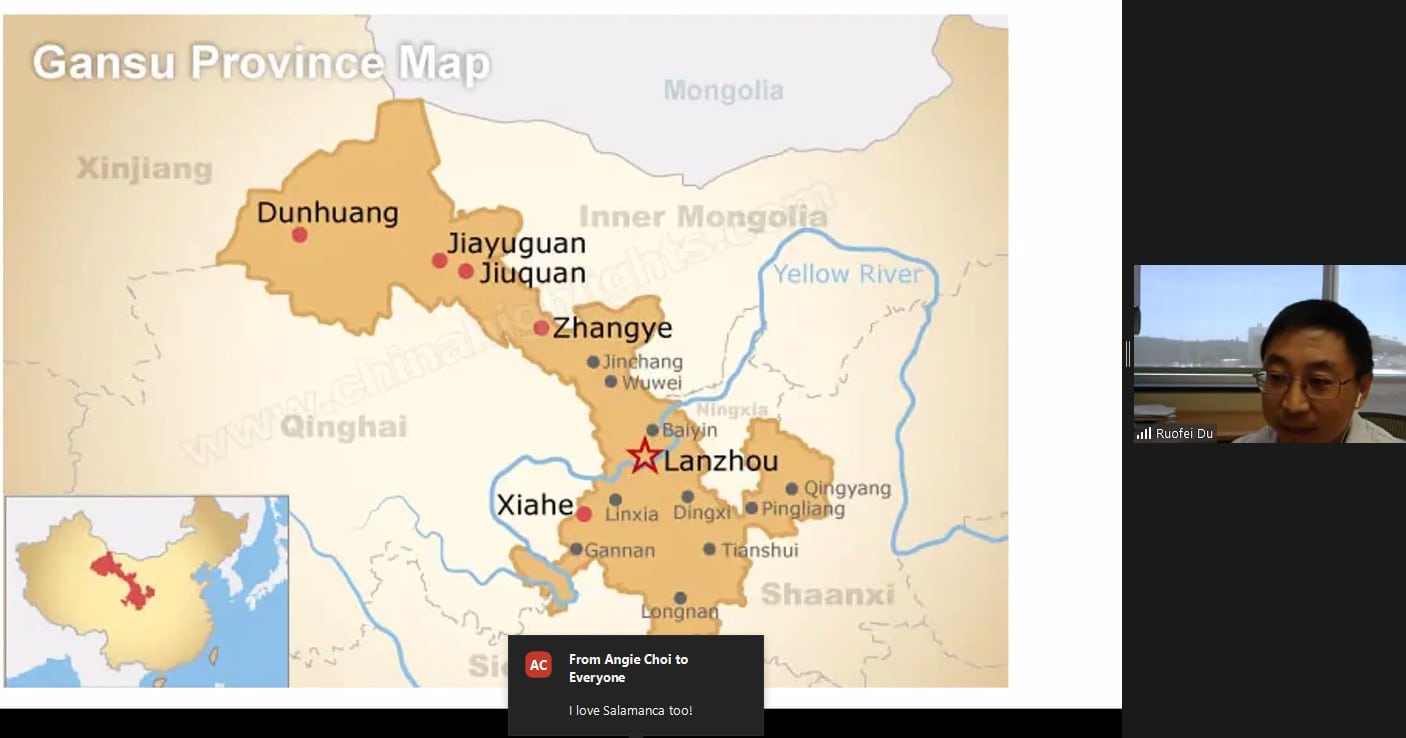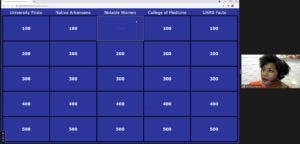View Larger Image

Ruofei Du, Ph.D., shows viewers a map of Gansu Province, where he grew up.
International Fest, Jeopardy Close Out Diversity and Inclusion Month
| Students and employees at the University of Arkansas for Medical Sciences (UAMS) were transported around the world one week and into the throes of a UAMS trivia competition the next as they virtually participated in lunchtime events in late September to top off celebrations of UAMS Diversity and Inclusion Month.
On Sept. 24, those who joined in International Fest via a Zoom presentation hosted by the UAMS Division of Diversity, Equity and Inclusion (DDEI) were welcomed with a video glimpse into diverse cultures as colorful graphics and music led them across the globe. As viewers were led across the continents, the names of countries sprang from the map, creating a vivid geography lesson as well.
Then, a panel of employees representing three of roughly 90 countries that make up UAMS’ student and employee population, shared abbreviated versions of their life stories, including how they came to work at UAMS, in the process highlighting unique aspects of Vietnamese, Korean and Chinese culture.
Odette Woods, who is DDEI’s senior director of staff diversity, equity and inclusion, moderated the virtual event, which she said was designed to engage employees during a second year in which popular in-person festivities were suspended due to the ongoing coronavirus pandemic. She said she is looking forward to a return next year to the live event, in which employees representing various cultures, many in native dress, set up booths in the ground-floor concourse of the UAMS Education II building offering cultural displays, samples of international cuisine and demonstrations of native music and dance. This year, campus community members were invited to explore the world through a special DDEI International Fest webpage that included videos, games, and articles.
Leading off the panel of presenters during the virtual festival was Toan Bui, a curriculum development specialist in Clinical Nursing Informatics and the Clinical Education Department. He said he and his family came to the United States in 1993 from Vietnam through Humanitarian Operation, a State Department relocation program for former Vietnamese political prisoners and their dependents.
After struggling to survive in Vietnam’s forests and jungles, Bui’s father was captured and imprisoned in 1975. He was released in 1982 and was finally accepted into the relocation program in 1992.
Bui said the family first landed in Houston, Texas. After undergoing a lengthy process and relocating to Arkansas, they obtained United States citizenship in 2002.
He got married in Arkansas in 2004, the same year he received his bachelor’s degree, which he followed in 2009 with his master of education degree, both from the University of Arkansas at Little Rock. Since he began working at UAMS 20 years ago, he said, “UAMS has become my second family.”
Among the Vietnamese mores he shared are that trust is a long process, academics are revered and elders are respected.
Next up was Angie Choi, Ed.D., an assistant professor in the UAMS College of Pharmacy, who was raised in America by her Korean parents.
Choi said her parents immigrated to the United States in 1971, when she was 3 years old, after an aunt married an American citizen and sponsored her family. She said her parents were eager to come to America after a lack of economic opportunity in South Korea following the Korean War, as she demonstrated by displaying a 1960s photograph of a desolate commercial area in the now-bustling capital of Seoul.
Choi said her parents moved the family to Arkansas in 1977, and she attended McClellan High School, where, she recalled, “I was the only Asian in my school.” At that time, there weren’t many Asians in Arkansas, and “I experienced a lot of discrimination,” she said.
Things got better when she attended Wellesley College, a private women’s liberal arts college in Wellesley, Massachusetts, and “for the first time in my life was surrounded by Asians of every culture. It was a profound experience.”
She studied abroad in Spain for a year, then moved to San Francisco, where she was again surrounded by Asian culture. She lived in California for 20 years, and during that time, she said, “I became deeply spiritual” and often traveled to India. She shared a photograph of her standing next to her spiritual advisor in the Himalayan foothills.
In 2008, Choi said, she moved back to Arkansas to help her elderly parents and started working at UAMS in 2009 in the College of Public Health. By this time, Arkansans had become more accepting of Koreans, she said, referencing the current “explosion of Korean culture” and the “Korean wave” of pop music in America.
Viewers heard next from a third panelist, Ruofei Du, Ph.D., who has been an assistant professor in the UAMS Department of Biostatistics since last year.
Du, who came to the United States when he was about 30, showed viewers a map of Gansu Province in north-central China where he grew up. He shared several photographs of Gansu, pointing out paintings inside caves and colorful rocks in the Gobi Desert, noting, “I see a lot of similarities between Gansu and the state of New Mexico.”
Du shared other photos, including those of a traditional Chinese New Year parade where participants in colorful attire walked on stilts. He discussed the significance of noodles – his favorite food, which his father recently taught him the elaborate process of making authentically.
One misconception many Americans have about China is thinking pandas live everywhere in the country, he said. But in reality, they live in only a few places in the country, and “my hometown, Longnan, is not far from the pandas’ hometown.”
Rounding out UAMS Diversity and Inclusion Month was a virtual version of UAMS Jeopardy! on Sept. 30 to test participants’ knowledge of past and present diversity-related topics focused on UAMS and Arkansas. The event was co-sponsored by the DDEI and the UAMS Library.
The categories from which participants chose included University Firsts, Native Arkansans, Notable Women, College of Medicine and UAMS Facts.
Andrea Hayes, a member of the Diversity and Inclusion Engagement Subcommittee that created and organized events for UAMS Diversity and Inclusion Month, moderated as participants competed to supply responses using the on-screen “chat” function.
In the process, participants learned (or in some cases remembered) that UAMS was founded in 1879, that it has 535 beds, that its employees represent 73 of Arkansas’ 75 counties and other historical facts such as that Mollie King, a professor of pathology, became the first full-time female faculty member at UAMS in 1917.
